 Ireland’s first campaign to promote disability confidence in business has been launched in the Mid-West. Employability Limerick & Clare worked closely with Limerick, Shannon & Ennis Chamber’s to bring this project to the region. The pilot project will run until the end of April and, post its initiation, has the potential to be rolled-out nationally.
Ireland’s first campaign to promote disability confidence in business has been launched in the Mid-West. Employability Limerick & Clare worked closely with Limerick, Shannon & Ennis Chamber’s to bring this project to the region. The pilot project will run until the end of April and, post its initiation, has the potential to be rolled-out nationally.
Funded through the Department of Justice and Equality, the project aims to build disability confidence within the business communities in Limerick and Clare and create opportunities for people with complex support needs to explore the world of work in their local area. The overall goal is to ensure that disability confidence will become a core value of business so that, as has been done in the UK, a disability confidence standard for Irish business can be developed.
To initiate the process, a survey has been issued to all businesses in the region as a baseline to benchmark the current level of disability confidence in business, measure the level of interest in disability confidence and identify companies who will commit to receiving advice and support to achieve the new standard. 
Ten businesses from the region are being sought to work as champion companies for disability confidence and a dedicated website www.disabilityconfidence.ie is being developed as a reference portal for all employers.
Speaking at the launch, Employability Limerick team leader Ursula MacKenzie said: “People with disabilities make up 11% of Ireland’s population and have a spending power of €3.3 billion, yet 63% of people with a disability are unemployed. Our aim is to reduce this statistic and encourage more employers t to look at a person’s ability rather than their disability.”
Author and Clare County Council employee Siobhán Mungovan, who has Spina Bifeda, gave an inspirational opening address at the launch event urging every employer in the room not to ‘judge the book by its cover’.
“Everyone deserves a fair chance. I completely understand the nervousness associated with employing someone with a disability but take a chance, you could be pleasantly surprised,” she said.
Founder of Disability Consultancy Services, George Percy, who lost his sight in 1995 at the age of 26, and has since built up a business that employs a staff of 16, encouraged business owners to be cognisant of the needs of people with disabilities, as employees and as customers.
“If a person with a disability has a bad experience with your company, they won’t be back,” he said.
“It’s like going on a first date; you only get one chance to make a good impression.”
In the UK, disability confidence is a recognised standard in business and the ‘purple’ pound is an estimated £212 billion market.
As outlined by Helen Macfarlane and Brendan Roach from the UK’s Business Disability Forum, who were guest contributors at the launch, companies like Sainsbury’s, Lloyds Banking Group and Ernst & Young have well-established disability confidence programmes.
“They understand how disability impacts all parts of their business, have identified and removed barriers for groups of people, and made the necessary changes to make their companies a better place to work and do business with.”
Limerick Chamber’s chief executive Dr James Ring, who has wholeheartedly embraced this project said: We will energetically work with all our project partners – Employability Limerick and Clare along with the Shannon and Ennis Chambers to make disability confidence an accepted norm in business henceforth.”
